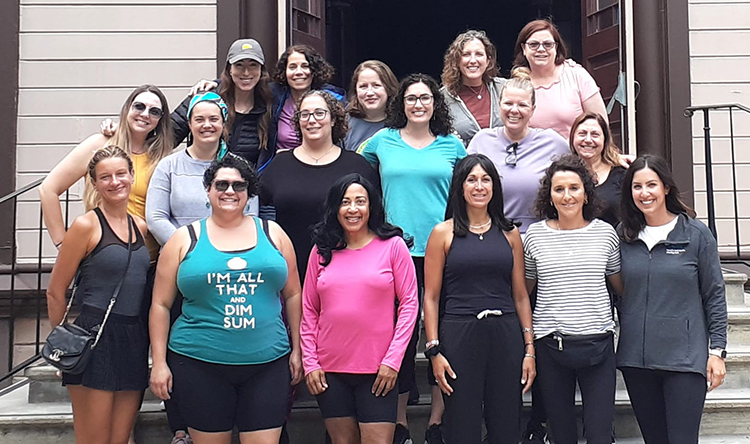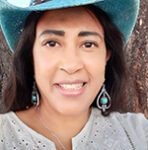
By Barrett Holman Leak
 SAN DIEGO — Kehilah. Achrayut. Chesed. Tzmicha.
SAN DIEGO — Kehilah. Achrayut. Chesed. Tzmicha.
I didn’t know how much I needed these four things in my life.
I have always been a leader, simply through being courageous, pioneering/ innovative or the optimistic big-picture person. Over a year ago, I entered into the third cohort of a community program designed for us Jewish women, and now feel I am an even stronger leader because of it.
I have been the executive director of a non-profit organization. However, before the program, I was lacking something and now I know it was four pillars. The Four Pillars of the Pauline Foster Women’s Leadership Program
Jewish Federation of San Diego describes The Pauline Foster Women’s Leadership Institute as “a holistic leadership development program for exceptional Jewish leaders committed to driving change in their organizations, the Jewish world, and beyond. The Institute offers a unique approach to leadership development through 10 sessions with an executive coach, cohort building retreats, and an immersive group experience”.
Pauline Foster (z”l) , who I later learned was the aunt of someone in a group I hang out with at my synagogue. He remembers her very fondly and her reputation as a leader was pioneering, responsible, compassionate and loving. Foster was the first woman elected as president of the Board of Directors of Jewish Federation of San Diego. Leadership appears to be in the family’s genes. Foster’s granddaughter, Shana Hazan, is president of the San Diego Unified School District Board.
Kehilah (Community)
Service to and for the greater community starts with a rich understanding of our community with its full diversity and complexity to support its need in the future.
In the PFWLI, we met monthly for three hours, preceded by dinner and then we learned from women leaders of Jewish institutions. I was unaware of the breadth of the work that is done to keep us all living, thriving and connected. Within the group, we each got to share our journeys and bond with one another, finding our commonalities, respecting our differences, learning from one another and walking with one another. Some of us were single, divorced, married, widowed, parents, pregnant or childless. We all wanted to be the best leaders we could be.
But the most significant way this sense of “we are in this together” came through was when the October 7 Hamas attack occurred, and our Jewish community gathered for a vigil at the JCC. On that rainy night, I drove up alone and stood there in the light rain on the grassy field, my mind racing. I found a very tall friend from my synagogue who gives good hugs. I needed one that dark, rainy evening. We chatted and weaved through the crowd and waited for the program to start. Then I heard my name. I turned to see Carolina from our cohort and we just hugged, holding onto each other. Soon we found Julie and others from our cohort and together we wrapped our arms around each other in the rain. We would get through this terrible moment in time and move forward together. I knew I was not alone.
Achrayut (Responsibility)
With leadership comes responsibility — responsibility to ourselves, others, and the community.
Being a leader means taking responsibility and I came to an even stronger sense of what that means. As we toured Jewish organizations and institutions, listened to presentations, and asked questions, I deepened my understanding of what it means to be a responsible leader. Achrayut is about making a moral commitment to others – to commit to making their concerns your concerns and doing something that leaves them in a better position. It is about doing something to bring resolution, healing or whatever is needed. It is not someone else’s problem.When the people you lead and serve have a problem it is your problem to handle. This is leadership.
Chesed (Loving Kindness)
Leadership is giving oneself fully with love, compassion, and empathy.
Leadership is always about approaching everything we do and the people we encounter, with love. Put ourselves in their shoes and have compassion. Keep your heart and ears open and listen. Keep your eyes open and watch. Sometimes this was emphasized not only in the formal session but it also played out in the conversations we would have beforehand over dinner or after the evening program closed.
I learned quickly when someone needed a hug, a few minutes of a listening ear or maybe just a smile and some silence. Some were coming from a long commute or had a rough day. Sometimes I was carrying a lot into the room; but we all found ways of connecting and thriving in the program.
Our evening at Seacrest Village Retirement Home integrated all the pieces of what it takes to lead such an organization and why being a good leader is vital in our Jewish community. You must give fully of yourself with love, empathy and compassion in order for a Jewish organization like Seacrest to provide secure and dignified living for the elders of our community. Throughout the program we met with or learned about leaders in the Jewish community who clearly were and are aligned with this pillar.
Tzmicha (Growth)
Leadership is an evolution — we are pushed to develop, take risks and innovate.
When I lived in Copenhagen, Denmark I started out as an English-speaking university student and one day found myself speaking fluently in Danish and then helping to launch and become the leader of an NGO focused on creating large-scale intercultural events involving multiple countries. I followed my vision, supported, coached, mentored and trained my team. They supported my big-picture vision.
One morning I awakened having received a “download” in my head that was a colorful vision of two red dragons dancing on Copenhagen City Hall Plaza. Over the next four months I did things I never thought I could do. I stretched myself. Besides handling the operating budget and fundraising, I was leading a large team of people while bridging the gap between Danes and the international visitors studying and working in Denmark.
I found myself at the Embassy of The People’s Republic of China in a diplomatic meeting. Months after that dream and with a lot of energy put into what never before had been done by an American in Denmark, there were thousands of people crowded into Copenhagen City Hall Plaza watching two dragons dancing. I innovated, never said “no” and was open to new ideas and different ways of doing things with my international team.
I knew it was my responsibility to keep my team inspired and motivated. Together we did great things, including a two-week-long Polish cultural celebration that included a mini-jazz festival. Outside of that, my ability to be flexible positively changed my life. A planned two-year stay became 10 years. The willingness to grow opened the door for me to teach occasionally at a Danish university as an adjunct lecturer (I never dreamed I could teach at a university!), to be an entrepreneurial small business owner of a tourism and travel business and to make global friends from Denmark, Poland, China, France, Vietnam, Spain, Germany and other places. I
have been able to visit some of them and had I refused to take risks and make unfamiliar moves, with unfamiliar people in a culture that was not native to me, I never would have gained such abundance.
Being able to grow, change, innovate – that excites me and that is encouraged in this program. How exciting it was to be in the PFWLI with other creative, visionary, intelligent women who want to incorporate Jewish values into their leadership. The stories of Jewish women who pushed boundaries, chose new directions and methods and took on leadership that women had not done before was empowering to hear. Sometimes you must move beyond your boundaries or push beyond limits you have imposed on yourself. Sometimes the solution to a problem means that you as a leader must be willing to innovate, take risks, and/or do a new thing.
As we left our final PWFLI group meeting I realized I had gained
- a powerful understanding and knowledge of our Jewish community and the people and organizations within it.
- ability to create a working definition of leadership that is undergirded by Jewish values and can be used to help inspire and ground the lay leadership of Jewish non-profits.
- a better understanding of women as leaders in changing times inclusive of the challenges we face and strengths we bring.
- a deeper understanding of and affinity for the local, national, and world Jewish community.
- an understanding a leader’s role in creating board cultures defined by strong, healthy relationships and goal achievement.
- ability to connect my desire to use my education, skills and abilities with living a life of service that reflects Jewish values.
There are retreats built into the program, some special events, and an opportunity to tour Jewish San Diego and better understand the history of the Jewish community in America’s Finest City.
If you are a Jewish woman who wants to sharpen her leadership skills to lead Jewish organizations and who wants to strengthen her personal and professional network, this is an excellent program.
The fourth cohort is now open for nomination or application!
*
Barrett Holman Leak is an author, educator and community organizer.